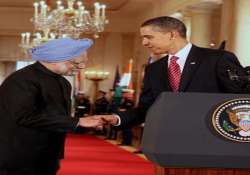US seeks strong military-to-military ties with India
Washington : Taking note of the rise of India and China, a top US commander has said that Washington looked forward to build a growing military-to-military relationship with the Indian armed forces in the interest

Washington : Taking note of the rise of India and China, a top US commander has said that Washington looked forward to build a growing military-to-military relationship with the Indian armed forces in the interest of regional security.
"It's good for the security of the region; it's good for our own national interest; it's good, I think, for Indian national interest," Admiral Samuel Locklear III, Commander of US Pacific Command or PACOM, told foreign media Tuesday.
"We're also looking at ways that we can pursue together maybe some joint ventures or joint sharing of the ways we go forward on some of the military equipment that we might build together," he said in a briefing on Asia-Pacific US Security Overview..
"So we're looking forward to a growing relationship [to] build a military-to-military with the Indian military," Locklear said taking note of "the rise of China, the rise of India in how they play as global economic and regional military powers."
The US-India Joint Declaration on Defence Cooperation issued after Prime Minister Manmohan Singh's September summit meeting with President Barack Obama "outlined clearly the direction that we want to go together," he said.
The defence department had last year given some direction "on how we should start working our plans to develop a longer-term strategic relationship with our Indian partners," Locklear said.
Citing the example of on ongoing Exercise Malabar between the navies of the two countries, he said the two countries have had "had growing military-to-military coordination for some time."
The exercise which has been held every other year for over a decade was "an opportunity for our US military ships to understand the Indian Navy, to understand the Indian waters, to help work together on the types of contingency things that we might plan together to work on," he said.
"We do similar types of things across other branches of the service as well, and those are, I think, quite productive and I believe they're growing," Locklear said.
In response to a question about recent increase in violence in Kashmir between India and Pakistan, he said "the relationship between India and Pakistan is one that I think has a long history that has the opportunity to continue to move forward in a positive way.
"And that border clashes, I think either country would say that it's not in the best security interests for those to continue, particularly if they want to move into the 21st century," he said.
On whether there was a risk of militants fighting in Afghanistan switching their attentions back to Kashmir after the US drawdown next year, he said the US had "a pretty robust dialogue with all of our allies and partners" across the region on how "to manage the flow of that terrorism"
"And this includes our dialogue with our partners both in India and in Pakistan," Locklear added.
"It's good for the security of the region; it's good for our own national interest; it's good, I think, for Indian national interest," Admiral Samuel Locklear III, Commander of US Pacific Command or PACOM, told foreign media Tuesday.
"We're also looking at ways that we can pursue together maybe some joint ventures or joint sharing of the ways we go forward on some of the military equipment that we might build together," he said in a briefing on Asia-Pacific US Security Overview..
"So we're looking forward to a growing relationship [to] build a military-to-military with the Indian military," Locklear said taking note of "the rise of China, the rise of India in how they play as global economic and regional military powers."
The US-India Joint Declaration on Defence Cooperation issued after Prime Minister Manmohan Singh's September summit meeting with President Barack Obama "outlined clearly the direction that we want to go together," he said.
The defence department had last year given some direction "on how we should start working our plans to develop a longer-term strategic relationship with our Indian partners," Locklear said.
Citing the example of on ongoing Exercise Malabar between the navies of the two countries, he said the two countries have had "had growing military-to-military coordination for some time."
The exercise which has been held every other year for over a decade was "an opportunity for our US military ships to understand the Indian Navy, to understand the Indian waters, to help work together on the types of contingency things that we might plan together to work on," he said.
"We do similar types of things across other branches of the service as well, and those are, I think, quite productive and I believe they're growing," Locklear said.
In response to a question about recent increase in violence in Kashmir between India and Pakistan, he said "the relationship between India and Pakistan is one that I think has a long history that has the opportunity to continue to move forward in a positive way.
"And that border clashes, I think either country would say that it's not in the best security interests for those to continue, particularly if they want to move into the 21st century," he said.
On whether there was a risk of militants fighting in Afghanistan switching their attentions back to Kashmir after the US drawdown next year, he said the US had "a pretty robust dialogue with all of our allies and partners" across the region on how "to manage the flow of that terrorism"
"And this includes our dialogue with our partners both in India and in Pakistan," Locklear added.